The PID Controller Market is estimated to be valued at USD 393.3 million in 2025 and is projected to reach USD 1780.2 million by 2035, registering a compound annual growth rate (CAGR) of 16.3% over the forecast period.
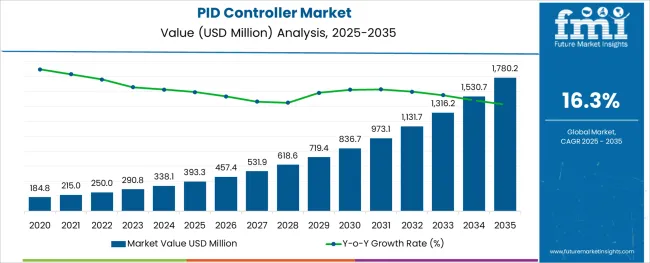
The PID controller market is undergoing consistent growth as industries seek tighter control over dynamic process variables to ensure system stability, efficiency, and safety. With the rise of Industry 4.0, demand for real-time adaptive control and integration with digital industrial platforms has grown substantially.
PID controllers are being incorporated into smart manufacturing lines, energy management systems, and advanced thermal processing operations where predictive accuracy and response speed are mission critical. Key industrial players are investing in PID solutions that offer multi-loop control, auto-tuning algorithms, and seamless compatibility with PLC and SCADA systems.
The proliferation of decentralized control networks and retrofitting of legacy systems with modern digital interfaces are further expanding deployment opportunities. As industries face tighter quality tolerances, energy usage targets, and cost constraints, PID controllers are expected to remain a core element in industrial control architectures, especially in applications where stability and responsiveness are paramount.
The market is segmented by Product Type and Industry Vertical and region. By Product Type, the market is divided into Temperature, Pressure, Flow, and Motion. In terms of Industry Vertical, the market is classified into Oil and Gas, Food and Beverages, Power, Chemical, and Others. Regionally, the market is classified into North America, Latin America, Western Europe, Eastern Europe, Balkan & Baltic Countries, Russia & Belarus, Central Asia, East Asia, South Asia & Pacific, and the Middle East & Africa.
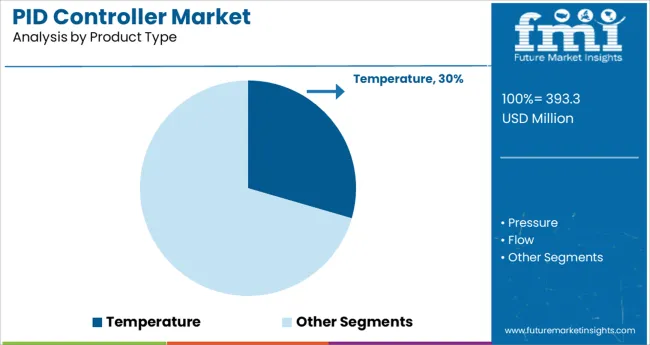
The temperature segment is expected to account for 29.5% of total revenue within the product type category in 2025, positioning it as the leading segment. This dominance is attributed to the critical role of temperature regulation in a wide array of industrial applications including chemical processing, food production, metal treatment, and plastics manufacturing.
The precision required in maintaining consistent temperatures for product quality and safety has made PID controllers indispensable in thermal systems. Advancements in sensor technologies and digital control interfaces have enabled temperature PID controllers to deliver faster response times and reduced overshoot, further reinforcing adoption.
Integration with IoT platforms and data analytics tools is enhancing remote temperature monitoring and fault detection, offering operational advantages across continuous production environments. These capabilities, coupled with stringent regulatory standards and the growing need for energy efficiency, have driven temperature PID controllers to the forefront of product type demand in the market.
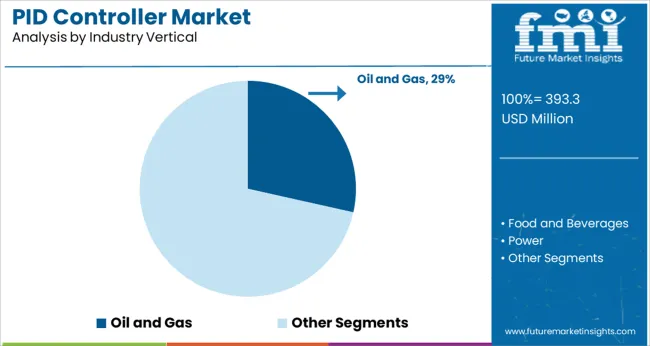
In terms of industry vertical, the oil and gas segment is projected to contribute 28.5% of total market revenue in 2025, making it the leading vertical for PID controller deployment. This leadership is driven by the need for high-precision process control in exploration, refining, and petrochemical operations, where fluctuations in pressure, flow, and temperature must be managed continuously.
PID controllers are widely utilized to stabilize critical systems such as distillation columns, heat exchangers, and pipeline flow regulators. The harsh and dynamic nature of oil and gas environments requires controllers that are both robust and adaptive, and PID solutions have proven to be reliable in these conditions.
With increased investment in offshore drilling, LNG infrastructure, and digital oilfield technologies, the integration of PID controllers into advanced automation systems has become essential. Real-time diagnostics, predictive maintenance, and remote accessibility are further amplifying their value, ensuring the oil and gas sector remains a major contributor to overall market growth.
The PID controllers market growth is anticipated to be impacted by the rising demand for hybrid temperature PID controllers in the oil and gas sector. Furthermore, the implementation of a hybrid temperature PID controller leads to lower prices and less power usage, which is likely to increase the demand for PID controllers.
The market for PID controllers is anticipated to rise due to the multifaceted applications of PID controllers in the food and beverage industry along with numerous other control systems. In addition to this, demand for PID controllers is estimated to remain high, since these are less expensive than PLC devices.
For a range of control tasks, there are affordable and potent PID controllers in the market today. The rising use of hybrid PID controllers for temperature control applications is a key PID controller market trend.
However, the PID controller market is likely to be limited from reaching its true potential on account of a couple of obstacles. It has been noted that there is a rising demand for PLC devices, which are used in industrial facilities due to their higher loop processing capacity and versatility. Hence, manufacturers are likely to choose PLC devices over PID controllers, which could hamper the potential of the market during the forecast period.
Overall, it can be anticipated that the demand for PID controllers is likely to follow an upward growth trajectory during the forecast period.
Over the years, there have been significant breakthroughs made in PID controller technology. Mechanical and pneumatic advancements, as well as electronic tubes, transistors, and integrated circuits, all lead to microprocessors. PID controllers, currently available in the market are microprocessor-based, which gives manufacturers the chance to include features like automatic tuning, gain scheduling, and continuous adaptation. As a result, it is anticipated to build opportunities for the PID controller market through 2035.
The complex automation system utilized for energy production and transportation is built using PID control in conjunction with logic, sequential functions, selectors, and basic function blocks.
Vendors are now able to reach higher sales numbers due to the development of smart PID and hybrid PID temperature controls. Due to all these factors, technological advancements and the creation of solutions are driving the PID controller market.
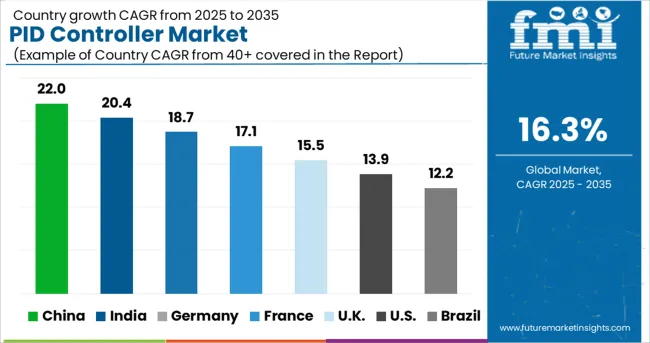
Europe is a crucial market, as it is concentrated with numerous key PID controller manufacturing companies. Furthermore, in 2025, it is anticipated to garner a market share of 20%. Industrial automation is becoming more prevalent, and the semiconductor industry is expanding quickly; both of which are likely to fuel the European PID controller market during the forecast period.
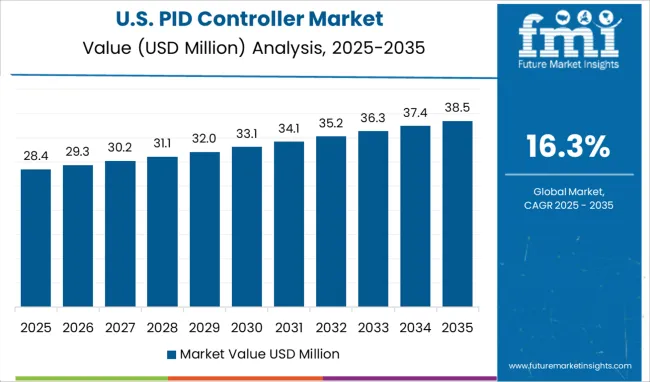
Due to increased competition among PID controller market players given the concentration of established players, North America is predicted to hold a market share of 28% in 2025.
During the projection period, it is anticipated that the PID controller market in North America could expand at a notable CAGR. This is attributed to the wide-ranging industrial applications, the advantages of PID controllers, technological developments, and the growth of the manufacturing sector.
The existence of numerous manufacturers has led to a highly fragmented PID controller market on a global scale. To meet the growing demand, major players in the global market are concentrating on product launches and technical advancements.
PID controllers are being used more frequently in manufacturing facilities to determine error values and get useful insights, which, in turn, helps in boosting process efficiency. Businesses jointly participate in cooperative research initiatives, including areas like artificial intelligence, software, and sensors, an addition to business-focused product development.
For instance, ABB strives to balance their short-and long-term research and development operations in similar fields in order to maximize return on investment.
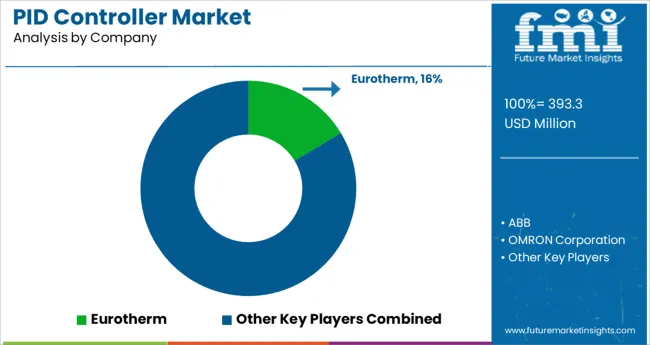
| Report Attribute | Details |
|---|---|
| Growth Rate | CAGR of 16.3% from 2025 to 2035 |
| Base Year for Estimation | 2025 |
| Historical Data | 2020 to 2024 |
| Forecast Period | 2025 to 2035 |
| Quantitative Units | Revenue in million and CAGR from 2025 to 2035 |
| Report Coverage | Revenue Forecast, Volume Forecast, Company Ranking, Competitive Landscape, Growth Factors, Trends, and Pricing Analysis |
| Segments Covered | Product Type, Industry vertical, Region |
| Regions Covered | North America; Latin America; Western Europe; Eastern Europe; The Asia Pacific excluding Japan; Japan; The Middle East and Africa |
| Key Countries Profiled | The USA, Canada, Brazil, Argentina, Germany, The UK, France, Spain, Italy, Nordics, BENELUX, Australia & New Zealand, China, India, GCC Countries, South Africa |
| Key Companies Profiled | ABB; Eurotherm (Schneider Electric); OMRON Corporation; Gefran; Calex Electronics Limited; TOPTICA PHOTONICS; Durex Industries; Enfield Technologies; West Control Solutions; Red Lion Controls, Inc |
| Customization | Available Upon Request |
The global pid controller market is estimated to be valued at USD 393.3 million in 2025.
It is projected to reach USD 1,780.2 million by 2035.
The market is expected to grow at a 16.3% CAGR between 2025 and 2035.
The key product types are temperature, pressure, flow and motion.
oil and gas segment is expected to dominate with a 28.5% industry share in 2025.






Full Research Suite comprises of:
Market outlook & trends analysis
Interviews & case studies
Strategic recommendations
Vendor profiles & capabilities analysis
5-year forecasts
8 regions and 60+ country-level data splits
Market segment data splits
12 months of continuous data updates
DELIVERED AS:
PDF EXCEL ONLINE
Spider Silk Fibers Market Size and Share Forecast Outlook 2025 to 2035
Spider Silk Fabric Market Size and Share Forecast Outlook 2025 to 2035
Spider Lift Market Size and Share Forecast Outlook 2025 to 2035
Epidural Guidance Systems Market Outlook - Share, Growth & Forecast 2025 to 2035
Epidemic Keratoconjunctivitis Treatment Market Overview – Growth, Trends & Forecast 2025 to 2035
Spider Cranes Market Analysis based on Lifting Capacity, Operation, Control System, Application, Ownership and Region: A Forecast from 2025 to 2035
Epidermal Nevus Syndrome Market
Rapid Microbiology Testing Market Forecast Outlook 2025 to 2035
Rapid Test Cards Market Size and Share Forecast Outlook 2025 to 2035
Rapid Prototyping Materials Market Size and Share Forecast Outlook 2025 to 2035
Rapid Test Readers Market Size and Share Forecast Outlook 2025 to 2035
Lipid-Based Vitamin C Market Analysis - Size and Share Forecast Outlook 2025 to 2035
Lepidolite Market Size and Share Forecast Outlook 2025 to 2035
Rapid Strength Concrete Market Size and Share Forecast Outlook 2025 to 2035
Rapid Self-Healing Gel Market Size and Share Forecast Outlook 2025 to 2035
Rapid Infuser Market Size, Growth, and Forecast 2025 to 2035
Rapid RNA Testing Kits Market Trends- Growth & Forecast 2025 to 2035
Rapid Hepatitis Testing Market – Demand & Forecast 2025 to 2035
Rapid Antigen Testing Market - Demand, Growth & Forecast 2025 to 2035
Lipid Nanoparticles Market Insights - Growth & Forecast 2025 to 2035

Thank you!
You will receive an email from our Business Development Manager. Please be sure to check your SPAM/JUNK folder too.
Chat With
MaRIA